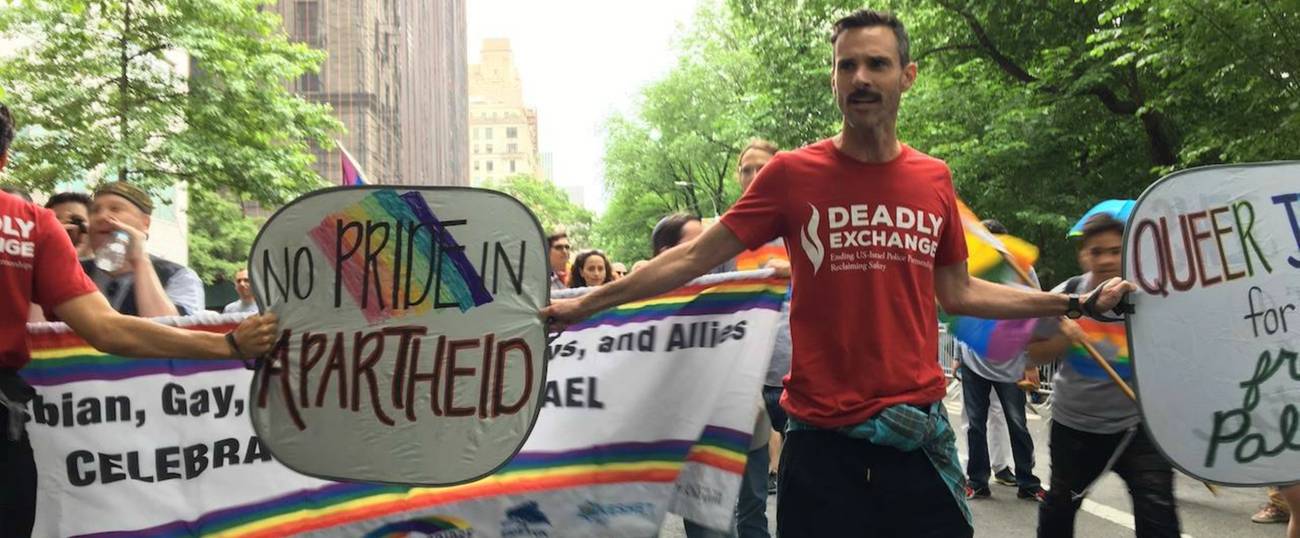LGBT Contingent ‘Infiltrated’ by Protesters at Celebrate Israel Parade
The LGBT group was a ‘carefully chosen target,’ said a director at Jewish Voice for Peace, which organized the anti-Israel demonstration on Sunday




On Sunday, the LGBT contingent of the Celebrate Israel Parade—made up of five Jewish LGBTQ organizations and the only openly gay group present on this day—marched proudly in one of New York City’s largest annual Jewish gatherings. At one point, the soundtrack accompanying their contingent was a popular Jewish techno song by Israeli pop artist Hashem Melech, which was blared from the parade’s sound system. The group of about 90 participants waved Israeli flags overhead. Most of them wore pride shirts; some of them were just teenagers for whom this was their first time marching in such an event.
Then, at around 1:45 in the afternoon, the music went silent.
According to Mordechai Levovitz, one of the organizers of the LGBT contingent as well as three others present, a female protester interrupted the sound system, causing it to go silent. Then, as seen in footage below, an estimated five protesters from Jewish Voice for Peace, a fringe group that advocates the total boycott of the state of Israel, disrupted the LGBT group. What many people described to me as a “whirlwind” ensued. Four of the five people that had been marching with the LGBT group took off the pride shirts that were given out to the marchers, revealing red shirts that said “Celebrate the end of apartheid all together.” They formed a barricade around the group, held up signs that read “Queer Jews for a free Palestine” and “No pride in apartheid,” which they also began chanting. The five were arrested.
Levovitz said the protesters had “infiltrated” the group by pretending to be a part of the march and then “sabotag[ed] us.”
Rebecca Vilkomerson, the Executive Director of Jewish Voice for Peace, said the LGBT marching contingent was “a carefully chosen target.” She explained that the protest was organized by “a group of queer Jews who feel strongly about gay rights not being used to pinkwash the occupation.”
This disruption was one of six JVP coordinated protests throughout the day. The other protests targeted groups like the NYPD and Mayor Bill DeBlasio’s float, causing two other arrests.
Protests at the Celebrate Israel parade is not an uncommon occurrence. In fact, since an LGBT contingent has marched in the parade, beginning in 2012, it has been targeted by protesters in some way every year, often from within their own Jewish community. For Rachael Fried, the assistant director of Jewish Queer Youth, an organization serving LGBTQ youth from orthodox backgrounds, her group’s participation in the parade is less about politics and more about identifying openly as an integral part of the Jewish community. “The Israel Day Parade is a time where all the Jewish non-profit organizations and schools from New York and beyond come together,” she explained. “That we’re there as the LGBTQ group who are part of the Jewish people is really important… to show the broader Jewish community that we exist.”
“[The protest] was a hate crime,” said Mordechai Levovitz, the founding director of JQY. “The reason this happened is because we were lesbian and gay and bisexual and transgender and queer. They targeted us. They didn’t target another high school; they targeted us, the queer kids.”
When asked whether or not it would have made a difference if the organization knew the number of minors that were in the group, and the extent of the vulnerability of the population, JVP’s Vilkomerson said, “No, we were just targeting the LGBT contingent [in general].”
Arun Viswanath, who was marching with the LGBT contingent as at the time of the protest as an ally, said, “It was a little rattling,” but the protest “ended up giving the LGBT contingent a lot more visibility than it otherwise would have had.”
Rachel Delia Benaim is a freelance religion reporter. Her work has appeared in The Washington Post, The Daily Beast, and The Diplomat, among others. Follow her on Twitter @rdbenaim.